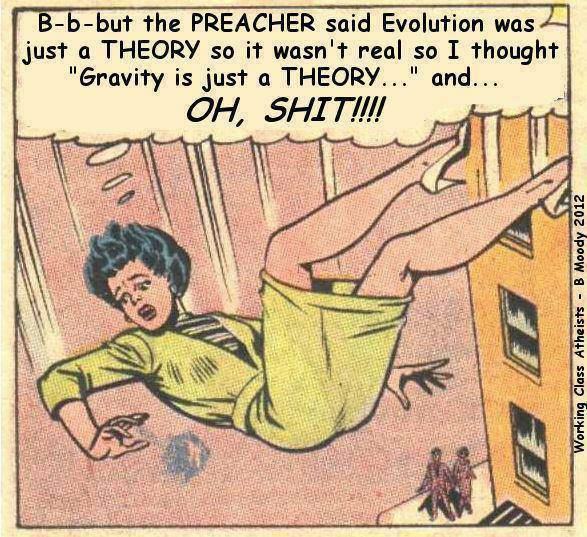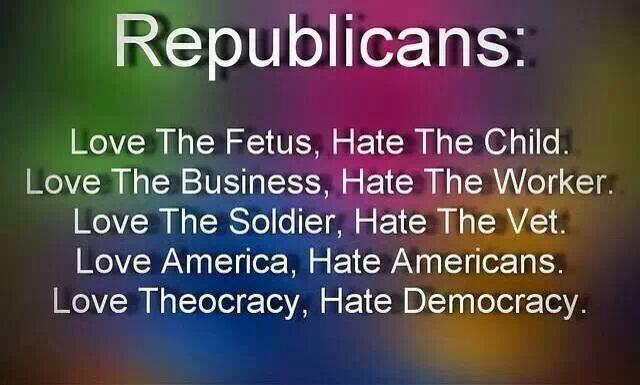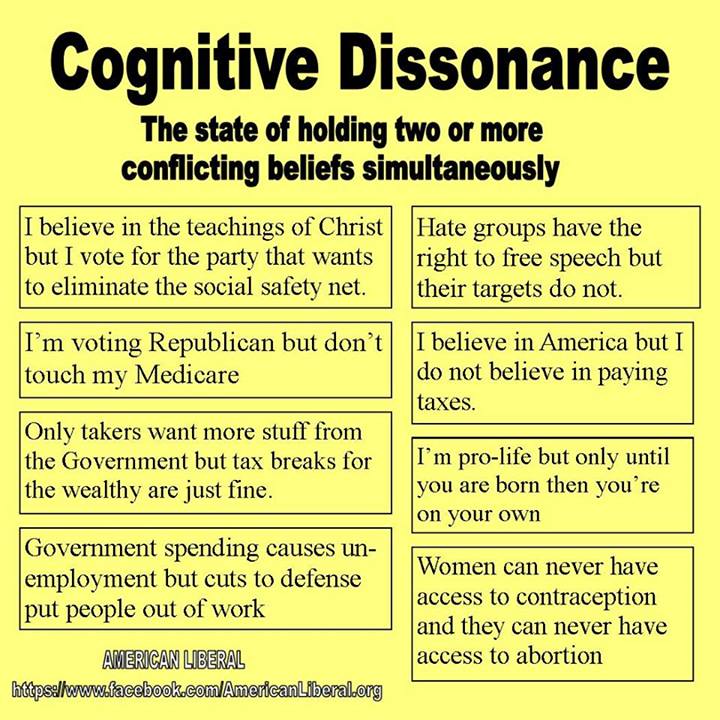You are using an out of date browser. It may not display this or other websites correctly.
You should upgrade or use an alternative browser.
You should upgrade or use an alternative browser.
signalmankenneth Sunday Funnies!
- Thread starter signalmankenneth
- Start date
christiefan915
Catalyst
So many good ones I can't pick a favorite. Maybe it's the one about being at war for 209/235 years.
The Law of Gravity is not a Theory, that's why it is called a Law rather than a Theory. I understand what they were trying to get across but they should try to be more accurate. Gravitational Theory is not the same thing as the "Theory of Gravity".
One must understand the difference between a Law and a Theory in science to fully comprehend this. But if you are pretending people are ignorant enough to not understand the difference between an invetsigational theory used by a detective and a Theory in science, one must understand how that same ignorant person would view the difference between a Law and a Theory.
A Law in science is observational, a Theory attempts to explain the "why" that observation is true, it is specifically a successful explanation that is supported by testing.
One must understand the difference between a Law and a Theory in science to fully comprehend this. But if you are pretending people are ignorant enough to not understand the difference between an invetsigational theory used by a detective and a Theory in science, one must understand how that same ignorant person would view the difference between a Law and a Theory.
A Law in science is observational, a Theory attempts to explain the "why" that observation is true, it is specifically a successful explanation that is supported by testing.
good post damo
what is it referring to?
One of the "funnies". I thought that was obvious.

signalmankenneth
Verified User
The Law of Gravity is not a Theory, that's why it is called a Law rather than a Theory. I understand what they were trying to get across but they should try to be more accurate. Gravitational Theory is not the same thing as the "Theory of Gravity".
One must understand the difference between a Law and a Theory in science to fully comprehend this. But if you are pretending people are ignorant enough to not understand the difference between an invetsigational theory used by a detective and a Theory in science, one must understand how that same ignorant person would view the difference between a Law and a Theory.
A Law in science is observational, a Theory attempts to explain the "why" that observation is true, it is specifically a successful explanation that is supported by testing.
http://www.thefreedictionary.com/theory+of+gravity
Mott the Hoople
Sweet Jane
pretty much wrong on all counts Damo. I'd suggest you learn the difference. Gravity and biological evolution are both scientific laws and theory. http://chemistry.about.com/od/chemistry101/a/lawtheory.htmThe Law of Gravity is not a Theory, that's why it is called a Law rather than a Theory. I understand what they were trying to get across but they should try to be more accurate. Gravitational Theory is not the same thing as the "Theory of Gravity".
One must understand the difference between a Law and a Theory in science to fully comprehend this. But if you are pretending people are ignorant enough to not understand the difference between an invetsigational theory used by a detective and a Theory in science, one must understand how that same ignorant person would view the difference between a Law and a Theory.
A Law in science is observational, a Theory attempts to explain the "why" that observation is true, it is specifically a successful explanation that is supported by testing.
pretty much wrong on all counts Damo. I'd suggest you learn the difference. Gravity and biological evolution are both scientific laws and theory. http://chemistry.about.com/od/chemistry101/a/lawtheory.htm
It's really embarrassing when the local "scientist" gets the difference between Theory and a Law wrong. The fact is the Law of Gravity is not the same thing as Gravitational Theory.
I'll give the definitions here, from the same exact site you used.
http://chemistry.about.com/od/chemistry101/a/lawtheory.htm
Theory
A scientific theory summarizes a hypothesis or group of hypotheses that have been supported with repeated testing. A theory is valid as long as there is no evidence to dispute it. Therefore, theories can be disproven. Basically, if evidence accumulates to support a hypothesis, then the hypothesis can become accepted as a good explanation of a phenomenon. One definition of a theory is to say it's an accepted hypothesis.
Example: It is known that on June 30, 1908 in Tunguska, Siberia, there was an explosion equivalent to the detonation of about 15 million tons of TNT. Many hypotheses have been proposed for what caused the explosion. It is theorized that the explosion was caused by a natural extraterrestrial phenomenon, and was not caused by man. Is this theory a fact? No. The event is a recorded fact. Is this this theory generally accepted to be true, based on evidence to-date? Yes. Can this theory be shown to be false and be discarded? Yes.
Law
A law generalizes a body of observations. At the time it is made, no exceptions have been found to a law. Scientific laws explain things, but they do not describe them. One way to tell a law and a theory apart is to ask if the description gives you a means to explain 'why'.
Example: Consider Newton's Law of Gravity. Newton could use this law to predict the behavior of a dropped object, but he couldn't explain why it happened.
As you can see, there is no 'proof' or absolute 'truth' in science. The closest we get are facts, which are indisputable observations. Note, however, if you define proof as arriving at a logical conclusion, based on the evidence, then there is 'proof' in science. I work under the definition that to prove something implies it can never be wrong, which is different. If you're asked to define hypothesis, theory, and law, keep in mind the definitions of proof and of these words can vary slightly depending on the scientific discipline. What is important is to realize they don't all mean the same thing and cannot be used interchangeably.
One of the "funnies". I thought that was obvious.
... it was obvious.
well, to most of us.
Mott the Hoople
Sweet Jane
Nice try at spinning Damo.It's really embarrassing when the local "scientist" gets the difference between Theory and a Law wrong. The fact is the Law of Gravity is not the same thing as Gravitational Theory.
I'll give the definitions here, from the same exact site you used.
http://chemistry.about.com/od/chemistry101/a/lawtheory.htm
Theory
A scientific theory summarizes a hypothesis or group of hypotheses that have been supported with repeated testing. A theory is valid as long as there is no evidence to dispute it. Therefore, theories can be disproven. Basically, if evidence accumulates to support a hypothesis, then the hypothesis can become accepted as a good explanation of a phenomenon. One definition of a theory is to say it's an accepted hypothesis.
Example: It is known that on June 30, 1908 in Tunguska, Siberia, there was an explosion equivalent to the detonation of about 15 million tons of TNT. Many hypotheses have been proposed for what caused the explosion. It is theorized that the explosion was caused by a natural extraterrestrial phenomenon, and was not caused by man. Is this theory a fact? No. The event is a recorded fact. Is this this theory generally accepted to be true, based on evidence to-date? Yes. Can this theory be shown to be false and be discarded? Yes.
Law
A law generalizes a body of observations. At the time it is made, no exceptions have been found to a law. Scientific laws explain things, but they do not describe them. One way to tell a law and a theory apart is to ask if the description gives you a means to explain 'why'.
Example: Consider Newton's Law of Gravity. Newton could use this law to predict the behavior of a dropped object, but he couldn't explain why it happened.
As you can see, there is no 'proof' or absolute 'truth' in science. The closest we get are facts, which are indisputable observations. Note, however, if you define proof as arriving at a logical conclusion, based on the evidence, then there is 'proof' in science. I work under the definition that to prove something implies it can never be wrong, which is different. If you're asked to define hypothesis, theory, and law, keep in mind the definitions of proof and of these words can vary slightly depending on the scientific discipline. What is important is to realize they don't all mean the same thing and cannot be used interchangeably.
Right... When your own source directly supports what I stated, when the definitions are exactly what I said they are, when the differences are exactly as I stated they were, it's not "spin" on my part.Nice try at spinning Damo.
The reality is, the words are not interchangeable and the one is not the other. My advice remains sound: If you want to make fun of supposedly ignorant people it is best not to show your own ignorance in the attempt.




















